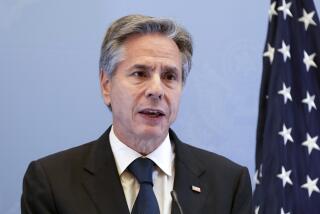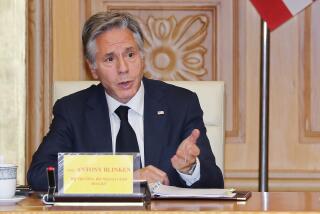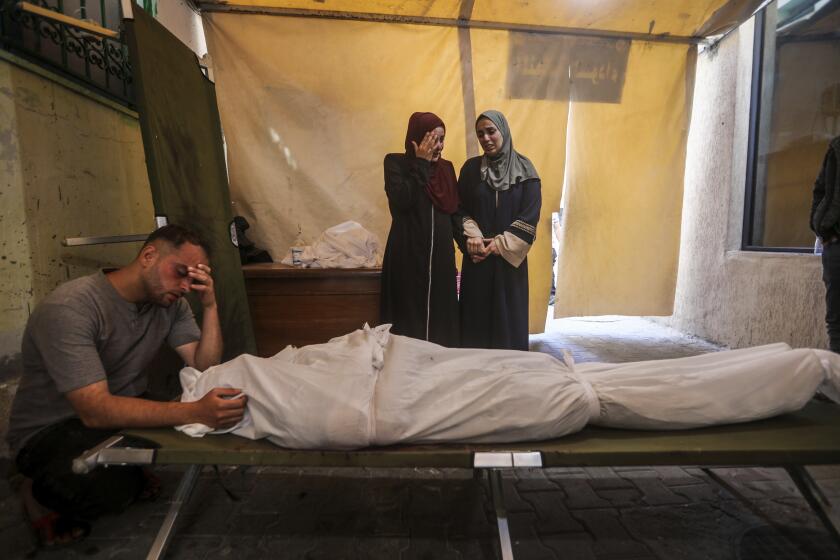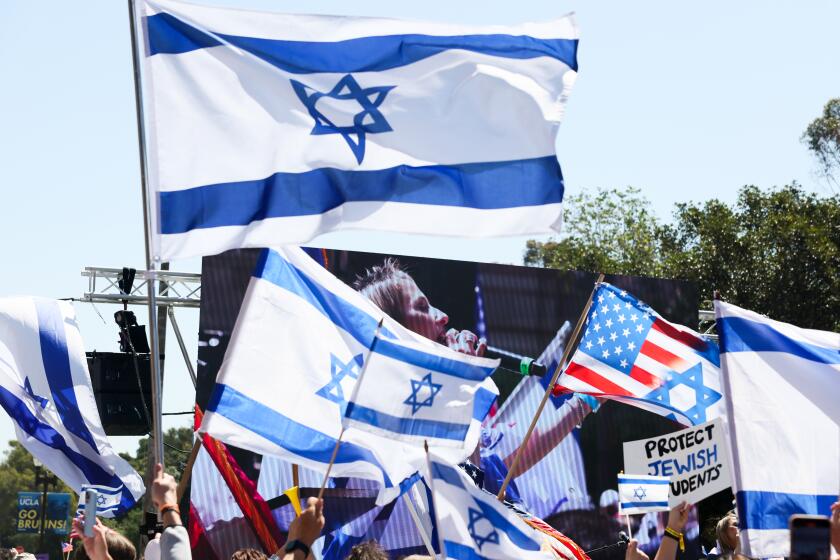Iran, world powers appear close to a nuclear agreement
WASHINGTON — Iran and six world powers appeared to close in on a preliminary agreement in Geneva on Thursday that would begin to limit Tehran’s nuclear development after a decade of frustrating negotiations, according to diplomats.
They said the proposed framework agreement, which could still falter, would require Iran to halt at least some enrichment activities in exchange for partial easing of economic sanctions. They described the expected accord as a significant first step intended to buy six months and perhaps longer to pursue a comprehensive final agreement.
Secretary of State John F. Kerry is traveling in the Middle East and is expected to fly to Geneva to sign off on the deal when the latest round of talks wrap up late Friday or Saturday, U.S. officials said.
President Obama has vowed to prevent Iran from obtaining a nuclear weapon, and he appointed Kerry to supervise the talks that resumed this fall amid the easing of tension with Tehran that followed the election of Hassan Rouhani, a relative moderate, as Iran’s president.
In an interview Thursday night on NBC News, Obama said his goal is to ensure that Iran begins to dismantle its nuclear program and that the international community can verify “that they are not developing nuclear weapons, that their nuclear energy program is peaceful. And frankly because of actions in the past, the world doesn’t trust them on that.”
He said he was prepared to roll back some economic sanctions to provide “some very modest relief” as part of an initial deal, but if the Iranians renege on their commitments, “we can crank that dial back up. So we don’t have to trust them.”
He said a diplomatic solution is “greatly preferable to us ratcheting up that conflict higher and higher, which ultimately might lead to some sort of [military] confrontation.”
Diplomats, who spoke on condition of anonymity to discuss sensitive negotiations, said they hope to reach a joint statement that lays out reciprocal steps each side will take in coming months, that says whether Iran will be allowed any enrichment capabilities at the end of the talks, and that describes the goal of ensuring that any nuclear material in Iran is used only for energy or other peaceful purposes.
The agreement also may set a schedule for completion of the negotiations.
“These talks are progressing much better and faster than many had anticipated,” said Ali Vaez, an Iran watcher in Istanbul, Turkey, with the International Crisis Group.
Negotiators from Iran and the six powers met as a group Thursday morning at the United Nations’ Palais des Nations and reconvened in smaller groups in the afternoon. The Iranian and U.S. teams, considered the core players, then met privately for an hour in the late afternoon, U.S. officials said.
White House Press Secretary Jay Carney applauded the apparent progress, saying the goal is a “phased approach that in the first step halts Iran’s nuclear program from moving forward and potentially rolls back parts of it.”
“This would stop Iran’s nuclear program from advancing for the first time in a decade,” he said.
He said the deal “would address Iran’s most advanced nuclear activities,” suggesting it would mothball or remove some of Iran’s most advanced centrifuges and lessen the threat from its stockpile of medium-enriched uranium, which can be converted into bomb fuel.
Carney said negotiators also seek to increase scrutiny of Iran’s nuclear facilities by the International Atomic Energy Agency, the United Nations’ nuclear watchdog agency, to ensure that Tehran won’t “use the cover of talks to advance its program.”
In exchange, he said, the administration was prepared to offer Tehran “limited, targeted and reversible relief” from the broad array of U.S. and other sanctions that have crippled Iran’s economy.
But in comments clearly aimed at members of Congress who fear the White House would accept too lenient a deal, Carney insisted that the administration will not ease sanctions aimed at Iran’s oil exports or banking systems, which would be difficult to restore. If Iran fails to meet its commitments, he said, the temporary relief will end and new sanctions will be imposed.
There are several ways the West could ease sanctions without removing the most punishing measures. Western powers could allow Iran access to billions of dollars in assets that it owns in overseas accounts, for example.
With both sides also playing to domestic audiences, Iranian officials declared that the United States, Britain, France, China, Russia and Germany had accepted Iran’s terms for a deal.
“They have accepted Iran’s proposed agreement,” Abbas Araqchi, Iran’s top negotiator, told Iranian state television.
U.S. officials said the daylong talks had produced a “serious and substantive conversation” but not a conclusion.
It is unclear whether the two sides have reached an accord on whether Iran will be allowed to continue low-level enrichment of uranium, which Tehran maintains is a sovereign right under the Nuclear Nonproliferation Treaty.
Mohammad Javad Zarif, Iran’s foreign minister, signaled that Iran was willing to take some steps to limit its nuclear program, but wanted to be able to tell Iranians that it would retain some enrichment.
Although Iran was willing to “deal with various issues … there won’t be a suspension of our enrichment program in its entirety,” Zarif told CNN.
Catherine Ashton, the European Union’s foreign policy chief and the chief contact for the six powers, is scheduled to meet with all the delegations Friday morning and then hold a one-on-one session with Zarif.
Her spokesman, Michael Mann, said the talks have entered a “serious phase.”
The seven countries last met in mid-October in a two-day session that diplomats said showed a new Iranian openness to discuss key issues. The two sides met five times in 2012 without producing any visible progress.
Iran insists it is enriching uranium for peaceful purposes, not nuclear weapons. Although some experts believe Iran already has in effect reached the threshold for building weapons, U.S. officials disagree and say Iranian officials have not decided to pursue nuclear arms and might need two years to build one if they resolved to do so.
Israeli Prime Minister Benjamin Netanyahu reacted with alarm to news of a possible deal in Geneva, warning that the six powers could be on the brink of a “mistake of historic proportions.”
Netanyahu, addressing a group of world Jewish leaders in Jerusalem, said he feared Iran would secretly continue work toward a bomb-making capability.
Israeli Intelligence Minister Yuval Steinitz told Israeli Army Radio that Israel fears “a bad interim agreement that will allow Iran to retain its enrichment capabilities and part of the enriched uranium in return for considerable easing of the sanctions, and this is a historic mistake.”
Robert Danin, a longtime U.S. diplomat in the Middle East, said Netanyahu’s broadside might not hurt the U.S. effort to make a deal, but it would probably anger the Obama administration.
With Kerry visiting Jerusalem this week, Netanyahu “clearly had an opportunity to use quiet diplomacy and opted not to.... The administration will likely resent the tone, and the timing, and a feeling that their room for maneuver has been constrained,” said Danin, now with the Council on Foreign Relations.
Special correspondent Batsheva Sobelman in Jerusalem and David Lauter and Kathleen Hennessey in the Washington bureau contributed to this report.
gton bureau contributed to this report.
More to Read
Start your day right
Sign up for Essential California for news, features and recommendations from the L.A. Times and beyond in your inbox six days a week.
You may occasionally receive promotional content from the Los Angeles Times.







